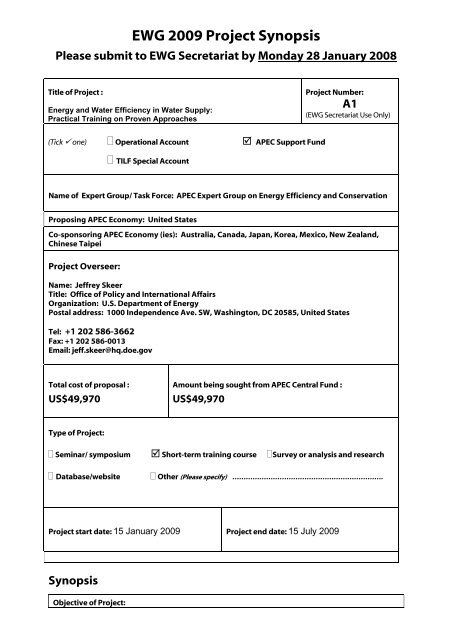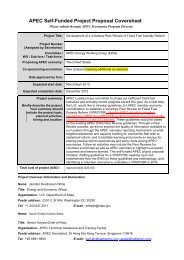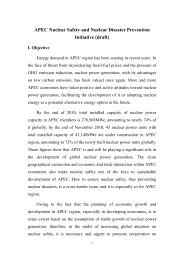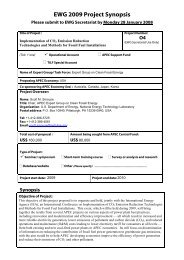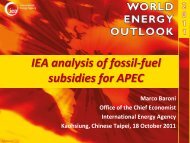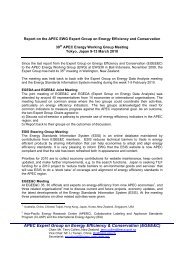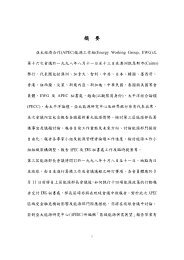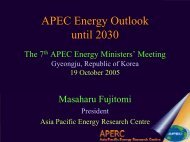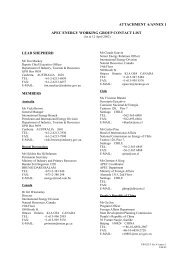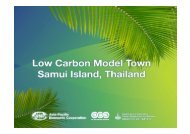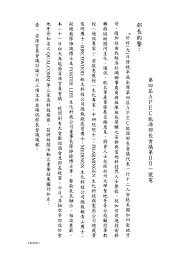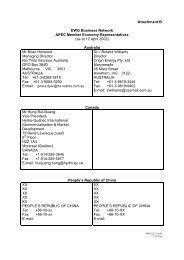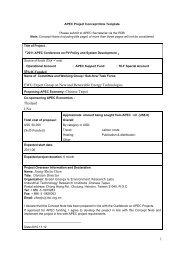APEC PROJECT FORMAT
APEC PROJECT FORMAT
APEC PROJECT FORMAT
You also want an ePaper? Increase the reach of your titles
YUMPU automatically turns print PDFs into web optimized ePapers that Google loves.
EWG 2009 Project Synopsis<br />
Please submit to EWG Secretariat by Monday 28 January 2008<br />
Title of Project :<br />
Energy and Water Efficiency in Water Supply:<br />
Practical Training on Proven Approaches<br />
Project Number:<br />
A1<br />
(EWG Secretariat Use Only)<br />
(Tick one) Operational Account <strong>APEC</strong> Support Fund<br />
TILF Special Account<br />
Name of Expert Group/ Task Force: <strong>APEC</strong> Expert Group on Energy Efficiency and Conservation<br />
Proposing <strong>APEC</strong> Economy: United States<br />
Co-sponsoring <strong>APEC</strong> Economy (ies): Australia, Canada, Japan, Korea, Mexico, New Zealand,<br />
Chinese Taipei<br />
Project Overseer:<br />
Name: Jeffrey Skeer<br />
Title: Office of Policy and International Affairs<br />
Organization: U.S. Department of Energy<br />
Postal address: 1000 Independence Ave. SW, Washington, DC 20585, United States<br />
Tel: +1 202 586-3662<br />
Fax: +1 202 586-0013<br />
Email: jeff.skeer@hq.doe.gov<br />
Total cost of proposal :<br />
US$49,970<br />
Amount being sought from <strong>APEC</strong> Central Fund :<br />
US$49,970<br />
Type of Project:<br />
Seminar/ symposium Short-term training course Survey or analysis and research<br />
Database/website<br />
Other (Please specify) ………………………………………………………….<br />
Project start date: 15 January 2009 Project end date: 15 July 2009<br />
Synopsis<br />
Objective of Project:
The purpose of the proposed project is to hold a training course for water utilities and municipalities<br />
in <strong>APEC</strong> economies to explain the benefits of launching efficiency programs in their water supply<br />
and/or wastewater treatment facilities, and to supply them with the information needed to do so. It<br />
has been conclusively demonstrated that enormous opportunities for water and energy savings<br />
exist in water supply and wastewater treatment systems. Most of these opportunities remain<br />
untapped, especially those relating to the energy use inherent in the supply of municipal water and<br />
wastewater services. These efficiency programs repay themselves rapidly and yield many rewards:<br />
reduced energy and water consumption, immediate improvements in water service, increased<br />
water delivery, and more revenue for system upgrades and new customer connections. A number<br />
of cities around the world—many in developing economies—have implemented technical and<br />
managerial improvements to raise energy and water efficiency in municipal water and wastewater<br />
systems, and there are many case studies that show the benefits of incorporating efficiency<br />
practices into water supply and wastewater treatment systems.<br />
Methodology:<br />
Development and planning for the training will build on contacts made and take into account lessons<br />
learned from previous <strong>APEC</strong> projects in this area: Sustainable Financing System for Energy-Efficiency -<br />
EWG 05/2003T, which looked at financing water projects in Mexico and the Philippines; and<br />
Development of Renewable and Energy Efficiency (Small Scale Project) Financing Best Practices and<br />
Guidelines for <strong>APEC</strong> Region Capital Market Development EWG 08/2005, which focused on Mexico<br />
and Thailand. A key focus will be on potential to improve the adequacy of energy and water supplies<br />
in <strong>APEC</strong> economies.<br />
The training will cover all aspects of designing, launching, and managing a program to improve<br />
efficiency in water supply and wastewater treatment on a long-term, ongoing basis. The training will<br />
target water utility staff and will be suitable for both managerial and technical levels; in those<br />
economies where municipalities have jurisdiction over water and wastewater, relevant municipal<br />
officials will also be invited. Although many water efficiency measures are very low-cost, the<br />
training will also address the use of performance-based contracting to finance the higher cost<br />
improvements. It will also include a facilitated discussion session so participants can discuss<br />
experiences and issues from their own facilities. Each trainee will receive a packet of materials,<br />
including: 1) a guide on energy and water efficiency that includes a set of recent case studies; 2) a<br />
manual on financing municipal energy efficiency projects, including those dealing with water and<br />
wastewater, that contains a set of templates for performance contracts and other documents<br />
needed to procure efficiency services; and 3) a compilation of Internet sites to access free tools such<br />
as software for system analysis and training videos.<br />
Participants from each <strong>APEC</strong> economy will be recruited based on the size of the city: large but not<br />
mega-cities, for example Bandung, Indonesia at 3.2 million; Santiago, Chile at 5.9 million; Cebu,<br />
Philippines at 1.7 million; and Ha Noi, Vietnam at 2.2 million. Larger cities typically have greater<br />
financial and institutional strength that puts them in a better position to rapidly implement water<br />
efficiency programs, and the resulting energy and water savings are significant. This makes larger<br />
cities a good strategic starting point because their successes are an incentive for other cities. A class<br />
size of approximately 35 is envisioned, although it can be greater depending on how many<br />
participants are able to cover their travel expenses. The budget assumes $12,000 in travel assistance<br />
for participants from less developed countries. Bangkok is proposed as the location for the training.<br />
Depending on the final location and timing of the workshop, another consideration could be to<br />
hold the meeting in tandem with an EGEE&C meeting, to accelerate the penetration of the<br />
information at both the national and local levels.<br />
How does the project proposal align with EWG and <strong>APEC</strong>-wide priorities:<br />
At EMM-8 in Darwin, Australia, Energy Ministers recognized that “meeting growing energy needs<br />
with a lower environmental impact requires cooperation to improve energy efficiency and cleaner<br />
more efficient energy technologies.” Ministers also recognized that addressing environmental<br />
challenges requires a “concerted response to promote energy efficiency and conservation, and<br />
develop and deploy cleaner and more efficient technologies,” and directed the EWG to “improve<br />
energy efficiency by sharing information on energy efficiency policies and measures.” By<br />
identifying and sharing best practices in designing, launching, and managing programs to improve<br />
the efficiency of water supply, this project aligns with Ministers’ directions to link energy efficiency<br />
and sustainable development.
INCORPORATING SUSTAINABLE DEVELOPMENT<br />
PRINCIPLES INTO EWG <strong>PROJECT</strong>S<br />
Process for incorporating sustainable development principles:<br />
1. Project Overseer complete self-assessment rating for each project proposal<br />
2. For <strong>APEC</strong>-funded projects, Project Overseer incorporate principles into the project tender,<br />
tender assessment, and project implementation phases<br />
3. On completion of a project, the Project Overseer describes how the principles were<br />
addressed and their impact at the project evaluation phase (through a separate report).<br />
Sustainable<br />
Development<br />
Principle<br />
Strengthening<br />
regional energy<br />
security<br />
Supporting energy<br />
market reform and<br />
energy infrastructure<br />
development<br />
Promoting uptake of<br />
clean and efficient<br />
energy and efficient<br />
use of energy<br />
Building capacity<br />
and technical<br />
cooperation within<br />
<strong>APEC</strong> economies<br />
Building publicprivate<br />
partnerships<br />
and strengthening<br />
stakeholder<br />
engagement, incl.w/<br />
the <strong>APEC</strong> business<br />
community<br />
TOTAL SCORE<br />
SELF-ASSESSMENT RATING<br />
Project Supporting Information<br />
Link (1<br />
point for<br />
each)<br />
1 Dependence on energy imports is a key energy<br />
security challenge for the <strong>APEC</strong> region. This<br />
project would help attain some of the enormous<br />
opportunities for energy savings that exist in <strong>APEC</strong><br />
economies’ water and wastewater systems by<br />
responding to the 2007 <strong>APEC</strong> Leaders’ Declaration<br />
on Climate Change, Energy Security, and Clean<br />
Development and sharing experiences on economic<br />
policy instruments for promoting energy efficiency<br />
in this sector.<br />
1 Water supply and wastewater treatment<br />
infrastructure is also energy infrastructure since its<br />
efficiency determines how much energy will be<br />
used in the delivery and treatment of water. The<br />
training would highlight policies and practices to<br />
make water infrastructure more energy efficiency.<br />
1 The project would work with water utilities and<br />
municipalities in the <strong>APEC</strong> economies to promote<br />
the benefits of launching efficiency programs in<br />
their water supply and/or wastewater treatment<br />
facilities, and to supply them with the information<br />
needed to do so.<br />
1 The project would build capacity and technical<br />
cooperation among utilities and municipal officials<br />
in the <strong>APEC</strong> economies participating in the<br />
training.<br />
1 The project would foster partnerships among<br />
municipal and other public officials, utilities, and<br />
wastewater treatment facilities. The <strong>APEC</strong><br />
business community will also be engaged through<br />
discussions of financing options and performancebased<br />
contracting.<br />
5


